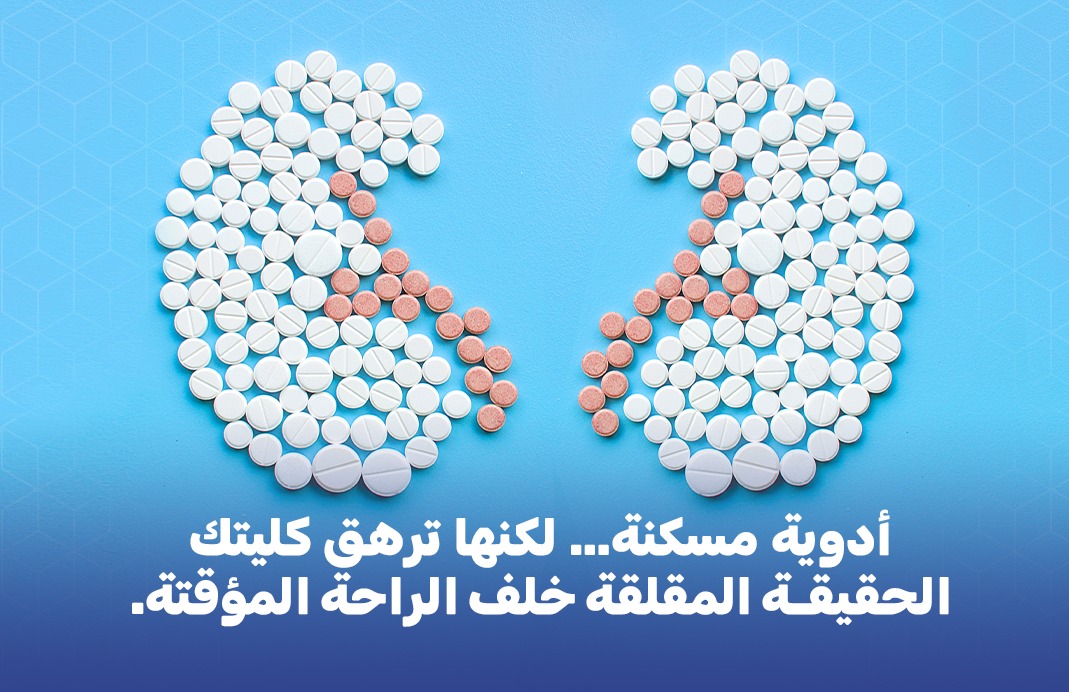Painkillers… But They Strain Your Kidneys
The Alarming Truth Behind Temporary Relief
When today’s comfort becomes tomorrow’s burden
In today’s fast-paced world, popping a painkiller has become the go-to solution for any discomfort:
Headaches after a long day, joint pain, muscle fatigue, or even just general unease.
But what many don’t realize is that these seemingly “harmless” and “common” medications can be the silent enemy of your kidneys, especially when overused or taken without proper awareness.
Can these small pills lead to chronic kidney disease?
Short answer: Yes—and more easily than you might think.
- Painkillers Most Linked to Kidney Damage
The most concerning group of drugs is known as:
Non-Steroidal Anti-Inflammatory Drugs (NSAIDs):
Ibuprofen – e.g., Brufen, Advil
Diclofenac – e.g., Voltaren, Olfen
Naproxen – e.g., Naprosyn
Aspirin – at high doses
🟡 These are commonly used for pain relief, fever reduction, and inflammation control—and often available without a prescription.
- How Do These Drugs Affect the Kidneys?
To understand the impact, we need to know a bit about how kidneys function:
The kidneys filter waste from the blood and require a steady blood flow to function efficiently.
A substance in the body called prostaglandins helps dilate blood vessels in the kidneys to ensure smooth blood flow.
When NSAIDs are taken:
Prostaglandins are suppressed
This causes blood vessels to constrict
Resulting in reduced blood flow and lower filtration rate (GFR)
This can lead to:
Temporary damage, which may resolve after stopping the medication
Or permanent, chronic damage, especially with repeated use or in combination with existing health conditions
- Who Is at Higher Risk for Kidney Damage?
Not everyone is equally vulnerable, but certain groups are more at risk:
People with chronic kidney disease (even in early stages)
Diabetics (especially those with protein in urine)
Those with high blood pressure
Seniors (age 60+)
Patients on diuretics or heart medications
Those with dehydration, liver, or heart disease
Anyone using painkillers daily or for more than a week consecutively
- Are All Painkillers Dangerous? What Are the Safer Alternatives?
Not all painkillers pose the same risk to the kidneys. Consider the following options:
✅ 1. Paracetamol (Acetaminophen):
Considered relatively safe for most kidney patients
⚠️ Use only at recommended doses and for a limited time
Be cautious with liver conditions or high doses
⚠️ 2. Codeine and Derivatives:
Effective for severe pain
May cause constipation, drowsiness, and risk of addiction
✅ 3. Topical Pain Relievers (Creams, Patches):
Excellent for joint and muscle pain
Lower systemic effects on the kidneys
🔴 Note: Even these alternatives should only be used under medical guidance, especially in kidney patients or the elderly.
- Are There Warning Signs of Kidney Damage?
Kidney disease is often called the “silent organ damage” because symptoms may go unnoticed for a long time. But warning signs may include:
Decreased urine output
Swelling in the feet or face
Unexplained fatigue or shortness of breath
Sudden high blood pressure
Elevated creatinine or urea levels in lab tests
- Practical Tips to Protect Your Kidneys from Painkillers
Don’t take any medication—even “common” ones—without consulting your doctor, especially if you have a chronic condition
Use the lowest effective dose for the shortest period
Stay well hydrated when taking medications (unless advised otherwise)
Monitor kidney function regularly (creatinine, urea, GFR tests)
Inform your doctor about all medications and supplements you take
Avoid combining multiple types of painkillers at the same time
Conclusion: Don’t Be an Enemy to Your Kidneys
A painkiller may give you temporary relief,
But misuse may come at a high cost: irreversible kidney damage.
✅ Awareness is your first line of defense
✅ Always consult your physician
✅ Remember: Every drug you take passes through your kidneys—they either filter it… or get exhausted by it.
References:
Whelton, A. (1999). Nephrotoxicity of NSAIDs. Am J Med, 106(5). DOI: 10.1016/S0002-9343(99)00165-5
Perazella, M.A. (2010). Drug-induced AKI. Curr Opin Crit Care, 16(6). DOI: 10.1097/MCC.0b013e328340a3eb
Ungprasert, P. et al. (2015). NSAIDs and CKD. Kidney Int Rep, 87(3). DOI: 10.1038/ki.2014.386
Gooch, K. et al. (2007). NSAID use and CKD progression. Am J Med, 120(3). DOI: 10.1016/j.amjmed.2006.06.034
Ghosh, S. & Scheepens, A. (2009). NSAIDs and oxidative kidney damage. Oxid Med Cell Longev, 2(3). DOI: 10.4161/oxim.2.3.8680



